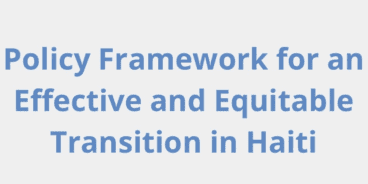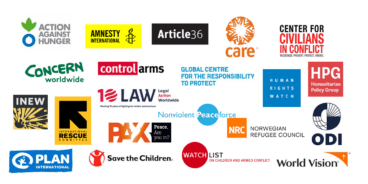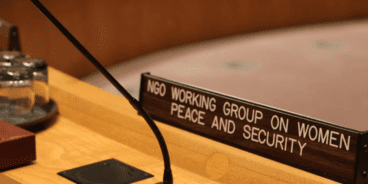
Joint NGO Letter: Recommendations on the UN Security Council Open Debate on Women, Peace and Security (WPS)
This open letter, available in Arabic, English, French, Spanish and Russian, was sent to all UN Member States on behalf of 438 civil society organizations across 94 countries in advance of the Security Council Open Debate on Women, Peace and Security (WPS) in October 2019. The letter calls on Member States and the Security Council to prioritize and commit full political support for 5 key WPS issues.
Dear Ambassadors,
Ahead of the annual Security Council open debate on women, peace and security (WPS), we take this opportunity to reiterate the fundamental principles enshrined in the WPS agenda, and urge you to be bold in making these principles a reality.
As non-governmental organizations dedicated to gender equality and women’s rights, we firmly believe that the feminist principle of women’s agency remains at the heart of the WPS agenda and that we cannot achieve sustainable peace without women’s full, equal and meaningful participation in all levels of decision-making. However, nearly 20 years since the adoption of Resolution 1325 (2000), despite the fact that conflicts disproportionately impact the health, safety, and the human rights of women and girls, they remain shut out of decision-making processes that determine their future. Meanwhile, within the very bodies tasked with protecting human rights and maintaining international peace and security, we have witnessed increasing and direct attacks on core principles of international humanitarian and human rights law, including as they apply to sexual and reproductive rights, and sexual orientation, gender identity and expression, and sex characteristics (SOGIESC). These developments signal that the impending anniversary of the WPS agenda must not be a cause for celebration, but a call to action that addresses the gendered impact of conflict and reaffirms the rights of all women and girls living in conflict-affected communities.
We have five key messages for Member States and Security Council members prior to this year’s open debate on women, peace and security, to which we urge you to commit your full political support.
- Take decisive action to prevent conflict, avert crisis and end war. As the urgent political and humanitarian crisis unfolds in North-eastern Syria, an estimated 450,000 people are at risk if all sides do not exercise maximum restraint and ensure safe, unhindered humanitarian access. All parties to the conflict must protect the rights of all affected persons in line with international human rights and humanitarian law. The current crisis is the latest in a string of failures that include Aleppo and Eastern Ghouta, where a divided Security Council has failed to take decisive action to avert catastrophe. Preventing conflict and sustaining peace are also not simply matters of ending war and violence – they must address the root causes of conflict, which include gender inequality and discrimination; militarization, arms proliferation and the political economy of war; violations of international humanitarian and human rights law; and emerging threats to peace and security, such as climate change. The urgency of addressing root causes can be seen in Libya, where civil society has highlighted that gender inequality, exacerbated by armed groups and the widespread availability of weapons, are among the primary causes of gender-based violence. Given the overwhelming evidence showing that gender inequality is a key predictor of violent conflict, the Security Council must reaffirm human rights, including the rights of all women and of those most marginalized, as central to all conflict prevention efforts in order to fulfill its responsibility to maintain international peace and security. Member States must not repress civil society, actively undermine peace or human rights by fueling economies of war or supporting warring parties, or enable arms transfers when there is a substantial risk that they may be used to commit serious violations of international human rights and humanitarian law, in line with the Arms Trade Treaty.
- Gender equality and the human rights of all women and girls are central to international peace and security. The full scope of the rights of all women and girls, including sexual and reproductive rights, must be protected in crisis; denial of sexual and reproductive services undermines all pillars of the WPS agenda. Women and girls affected by conflict often have limited access to justice, livelihoods, education, and healthcare, including reproductive health care, that can make them particularly vulnerable to gender-based violence. As the UN Fact-Finding Mission (FFM) documented in its report on Myanmar in August 2019, Rohingya women and girls were subject to extreme sexual and gender-based violence, which formed a core part of its findings of genocide. Adequate health services, including psychosocial support, and meaningful accountability are urgently needed for survivors. Over half of the one million Rohingya refugees who fled Myanmar are women and girls of reproductive age, underscoring the need for sexual and reproductive health services, including contraception, in the camps. As the FFM also found, transgender Rohingya women have been doubly persecuted and deliberately targeted for gender-based violence because of their ethnic and gender identity. Given the persistence of xenophobia, misogyny, homophobia, and transphobia in these and other contexts, it is critical to increase attention to multiple and intersecting forms of discrimination faced by women and girls in conflict. It is also vital that the specific challenges facing young women, migrant and refugee women and girls, women and girls with disabilities, indigenous women and girls, people of diverse SOGIESC, and older women are fully integrated into WPS implementation by all actors. Member States and Security Council members must speak out publicly against any attempts to undermine the human rights of all women, girls and gender-non-conforming people, and strongly signal that such attacks are unacceptable.
- Women’s right to full, equal and meaningful participation in all aspects of peace and security, including all formal and informal processes, must be safe-guarded and non-negotiable. The exclusion of women and girls from peace processes is unacceptable and results in peace agreements that do not reflect their rights, experiences, or needs. Parties to the conflict in Yemen refused to include the UN-established Women’s Technical Advisory Group in formal peace talks in December 2018 and women’s rights and gender provisions were completely excluded from the resulting Stockholm Agreement. Arguments that the inclusion of women or women’s rights are secondary to “getting the conflict parties to the table,” “stopping the fighting first” or “saving lives” undermine human rights, sustainable peace and development, and ignore the overwhelming evidence that peace agreements are more likely to fail without women’s participation. Women’s meaningful participation – enabling women’s inclusion so that they can influence the outcome of negotiations and discussions – must be politically and financially supported, and safe-guarded as a right. We urge the UN, Member States and Security Council members to support peace processes that include diverse and meaningful participation of women, and to call out any processes that fail to do so. Member States must ensure that all women are able to participate fully, free of the fear of reprisals. We also urge Member States to recognize that it is not enough to enable a small number of women to reach leadership positions; effectively addressing the barriers to participation for all women is critical for long-term change and full implementation of Resolution 1325 (2000).
- Defend the legitimacy of the work of all human rights defenders and their role in promoting peace and security, and condemn all attacks against them. In March 2019, the Special Rapporteur on Human Rights Defenders reported “a worrying rise in misogynistic, sexist and homophobic speech by prominent political leaders in recent years, normalizing violence against women and gender non-conforming persons” and that women human rights defenders have reported “increased repression, violence and impunity.” In May 2019, the Office of the High Commissioner for Human Rights expressed alarm at the number of human rights defenders, including women, community leaders, Afro-Colombians, indigenous people, environmentalists, and journalists, killed in Colombia – 51 activists in four months. Most recently in Sudan, women played a leading role in the recent protests against the military dictatorship but were specifically targeted for their activism by security forces that violently attacked the demonstrations and detained hundreds of people. Despite these alarming global trends and examples, in 2018, there were no references to women human rights defenders in any of the outcome documents adopted by the Security Council. Threats to human rights defenders (HRDs) undermine global efforts to prevent conflict and sustain peace. The lack of recognition for the legitimate work of HRDs creates a context that enables all kinds of attacks, including physical, legislative, judicial and digital, to take place. As long as ordinary women and gender non-conforming persons, HRDs, women activists, peacebuilders and women politicians are the targets of violence and harassment, they cannot freely participate in public or political life. In addition to regularly and meaningfully consulting with diverse women’s civil society and ensuring that their recommendations guide action directed at their communities, Member States must ensure their safety and protection from reprisals, including for cooperating with UN bodies, and speak out publicly against such attacks to send an unequivocal message that they will not be tolerated.
- Meaningful action on women, peace and security requires recognizing the interrelated, inseparable and mutually reinforcing nature of all elements of the WPS agenda, and committing to full implementation. Protection of women from gender-based violence is inseparable from women’s meaningful participation, bodily autonomy and rights, and ensuring accountability for violations of fundamental human rights is necessary in order to prevent relapse into conflict. The 20th anniversary of the adoption of Resolution 1325 (2000) should reinforce the commitment of all actors to advance the WPS agenda as a whole, defend the full scope of women’s rights, and galvanize action to address clearly identified gaps. Specific provisions on women and gender were almost universally absent from ceasefire and peace agreements resulting from UN-led or co-led processes in 2018. Nearly five years since the three peace and security reviews in 2015, only 50% of the recommendations on WPS have progressed and only two recommendations out of 30 were fully implemented; all recommendations of the reviews must be fully implemented without exception and all actors held accountable for failure to do so. All stakeholders involved in peace processes have an obligation to ensure the principles of gender equality and women’s human rights are enshrined in any final outcome. Member States have an obligation to ensure the UN has the capacity it needs to implement the WPS agenda through full resourcing of all relevant posts via the Fifth Committee. Member States must call on Secretary-General Guterres to show leadership by personally committing his office to ensuring that WPS is a priority for all his Special Envoys and Special Representatives, and that there is system-wide accountability for failure to implement WPS. It is vital that the Security Council, as the primary UN body entrusted with peace and security matters, leads by example by fully implementing all resolutions comprising the WPS agenda and integrating a gender perspective into all aspects of peace and security. As the 20th anniversary of Resolution 1325 (2000) approaches, outcomes that damage or fail to advance the core tenets of the WPS agenda, or endorse anything less than full implementation, are unacceptable.
Although spaces for consensus are decreasing, we still agree that nothing is more central to the function of the United Nations than the prevention of conflict and the protection of those most affected by it. In the nearly 20 years since the passage of Resolution 1325 (2000), the WPS agenda has offered real hope in the realization of this central tenet, and it is now under threat.
WPS Champions: A Call to Action
The political cost of being a WPS champion for UN Members States and Security Council members has increased. Meaningful advancement of the WPS agenda now means speaking out and stepping up when the rights of all women, girls, and gender-non-conforming people, the rights and access of civil society, and the integrity of the multilateral system, are under attack. Being a WPS champion means defending the agenda we have collectively built and implementing it for the communities it is meant to serve.
*For a full list of signatories, see the Downloads below.
Related Content


